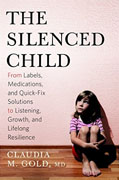The Silenced Child
Claudia M. Gold, MD
book reviews:
· general fiction
· chick lit/romance
· sci-fi/fantasy
· graphic novels
· nonfiction
· audio books
· author interviews
· children's books @
curledupkids.com
· DVD reviews @
curledupdvd.com
newsletter
win books
buy online
links
home
for authors
& publishers
for reviewers

 |
The Silenced Child: From Labels, Medications, and Quick-Fix Solutions to Listening, Growth, and Lifelong Resilience Claudia M. Gold, MD Da Capo Lifelong Press Hardcover 272 pages May 2016 |
|
How often have you heard these terms applied to children in your life—difficult, oppositional, explosive, defiant, inflexible, impulsive? And how often in recent times have you heard that a child has ADHD, OCD, or “defiant disorder”? And how often are these conditions, even in very young children, associated with prescription medications?
Gold has worked with many parents whose sincere wish was to get a baby to stop screaming at bedtime, or help a teenage daughter eat healthy foods, or keep a little boy from having a meltdown on family outings. She has seen the scenario change rapidly when parents begin to recall their own upbringing, for example, the ways they were treated, or mistreated, as children. Sometimes the answer lies in more recent events: a mother goes back to work when her baby is eight weeks old and not surprisingly, that’s the time when the excessive crying, sleep disorder, etc., begins. Some of these connections may seem obvious, but it’s sobering to realize that if the right questions never get asked, the answer may be a serious psychiatric diagnosis for a child as young as four years old, and the beginning of a lifelong dependence on psychotropic drugs for a child who need not have taken anything. In referring to the medication, or overmedication, of children, Gold says that when the medicine “silences what the child is trying to communicate, making the true elephant in the room invisible, the full responsibility then falls squarely on the child’s shoulders.” Now the adult can abdicate responsibility, and let pharmacological wisdom rule. Written in a gentle but firm narrative interweaving many case histories, Gold’s book speaks of the Buddhist idea that there is such a thing as “ordinary suffering” that we all must experience, and that the rush to label and diagnose every little wobble, teary eye or misstep often overrides what might well be a temporary, fixable problem. Listening, she feels, is the key. Listening is not only informative for the listener, but being listened to creates a sense of trust. Even the parent of an infant can “hear” what the child is trying to express, through thoughtful observation. Other therapeutic interventions that can stave off the automatic labeling and prescribing include music, of whatever type, and yoga. Anyone who has a young child in his or her life, whether it be one’s own offspring, or a grandchild or other relative or close friend’s child, should read and carefully consider, no, take to heart, the message of The Silenced Child Originally published on Curled Up With A Good Book at www.curledup.com. © Barbara Bamberger Scott, 2016 |
|
|
|
 Click here to learn more about this month's sponsor! |
|
| fiction · sf/f · comic books · nonfiction · audio newsletter · free book contest · buy books online review index · links · · authors & publishers reviewers |
|
| site by ELBO Computing Resources, Inc. | |
 Claudia M. Gold, MD, is a practitioner of behavioral pediatrics who believes, based on her observations, that simple listening can “cure” a lot of these “symptoms” without resorting to heavy, mind-numbing drugs. She examines the concept of “childism,” the bias against children that applies words like “defiance” to the young as a way of dismissing their unspoken needs and refusing to dig deeper for true solutions. Like much of what Gold wishes to convey, this is a powerful notion that deserves our attention. Too often, pediatricians are pressed to medicate children who “won’t behave” in school or at home, and though the medical practitioners may not think it the best solution, their hands are tied by the mental health system that has already labeled and “shelved” these kids.
Claudia M. Gold, MD, is a practitioner of behavioral pediatrics who believes, based on her observations, that simple listening can “cure” a lot of these “symptoms” without resorting to heavy, mind-numbing drugs. She examines the concept of “childism,” the bias against children that applies words like “defiance” to the young as a way of dismissing their unspoken needs and refusing to dig deeper for true solutions. Like much of what Gold wishes to convey, this is a powerful notion that deserves our attention. Too often, pediatricians are pressed to medicate children who “won’t behave” in school or at home, and though the medical practitioners may not think it the best solution, their hands are tied by the mental health system that has already labeled and “shelved” these kids.